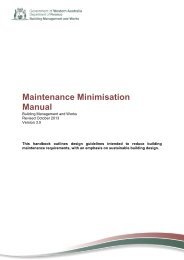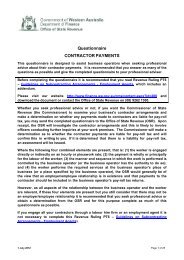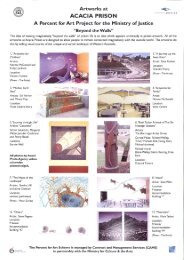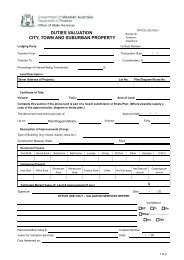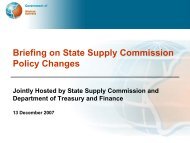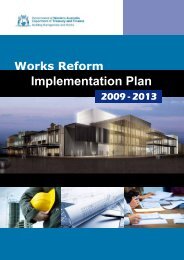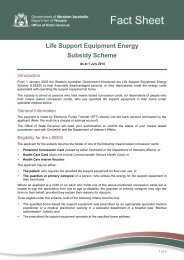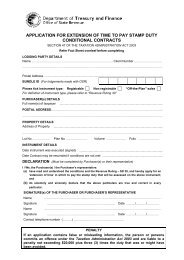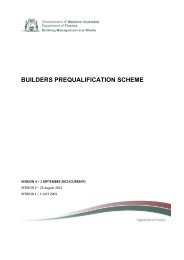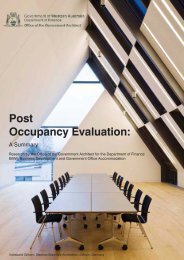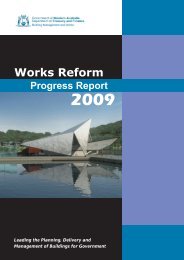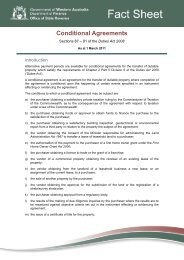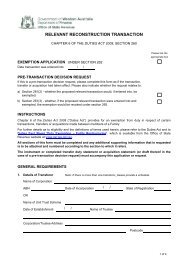Transactions Related to the Break-up of a Marriage or De facto ...
Transactions Related to the Break-up of a Marriage or De facto ...
Transactions Related to the Break-up of a Marriage or De facto ...
Create successful ePaper yourself
Turn your PDF publications into a flip-book with our unique Google optimized e-Paper software.
<strong>Transactions</strong> <strong>Related</strong> <strong>to</strong> <strong>the</strong> <strong>Break</strong>–Up <strong>of</strong> a<br />
<strong>Marriage</strong> <strong>or</strong> <strong>De</strong> Fac<strong>to</strong> Relationship<br />
Sections 128 – 133 <strong>of</strong> <strong>the</strong> Duties Act 2008<br />
As at 1 July 2008<br />
Introduction<br />
After <strong>the</strong> breakdown <strong>of</strong> a marriage <strong>or</strong> de fac<strong>to</strong> relationship, dutiable transactions <strong>of</strong>ten occur <strong>to</strong><br />
distribute property <strong>to</strong> <strong>the</strong> parties <strong>to</strong> <strong>the</strong> relationship. These transactions may be chargeable with<br />
nominal transfer duty if certain criteria are met. If <strong>the</strong>se criteria are not met, transfer duty will be<br />
charged at ei<strong>the</strong>r <strong>the</strong> general rate <strong>or</strong> a concessional rate, as <strong>the</strong> case may be.<br />
When nominal duty is chargeable<br />
Matrimonial instrument<br />
Nominal duty is chargeable on a dutiable transaction <strong>to</strong> <strong>the</strong> extent that it is effected by, <strong>or</strong> is in<br />
acc<strong>or</strong>dance with, a matrimonial instrument if:<br />
• <strong>the</strong> parties <strong>to</strong> <strong>the</strong> marriage are separated <strong>or</strong> div<strong>or</strong>ced <strong>or</strong> <strong>the</strong> marriage has irretrievably broken<br />
down; and<br />
• <strong>the</strong> property <strong>of</strong> ei<strong>the</strong>r <strong>or</strong> both <strong>of</strong> <strong>the</strong> parties <strong>to</strong> <strong>the</strong> marriage (which may include<br />
s<strong>up</strong>erannuation) is being transferred <strong>to</strong> ei<strong>the</strong>r <strong>or</strong> both <strong>of</strong> <strong>the</strong> parties <strong>to</strong> <strong>the</strong> marriage, a child <strong>of</strong><br />
ei<strong>the</strong>r <strong>of</strong> <strong>the</strong> parties <strong>or</strong> a trustee <strong>of</strong> such a child, <strong>or</strong> a trustee <strong>of</strong> a s<strong>up</strong>erannuation fund.<br />
A ‘matrimonial instrument’ is a maintenance agreement registered <strong>or</strong> approved under section<br />
86 <strong>or</strong> 87 <strong>of</strong> <strong>the</strong> Family Law Act 1975 (‘<strong>the</strong> FLA’), a financial agreement under section 90B, 90C <strong>or</strong><br />
90D <strong>of</strong> <strong>the</strong> FLA, a splitting agreement under Part VIIIB <strong>of</strong> <strong>the</strong> FLA, <strong>or</strong> an <strong>or</strong>der <strong>of</strong> a court under<br />
<strong>the</strong> FLA.<br />
It should be noted that <strong>the</strong> property <strong>of</strong> ei<strong>the</strong>r <strong>or</strong> both <strong>of</strong> <strong>the</strong> parties does not include property<br />
owned by companies <strong>or</strong> unit trusts in which ei<strong>the</strong>r <strong>or</strong> both <strong>of</strong> <strong>the</strong> parties own some <strong>or</strong> all <strong>of</strong> <strong>the</strong><br />
shares <strong>or</strong> units. F<strong>or</strong> example, if a husband and wife own all <strong>the</strong> shares in a company that owns<br />
land, it is considered that <strong>the</strong> land is <strong>the</strong> property <strong>of</strong> <strong>the</strong> company and not <strong>of</strong> <strong>the</strong> husband and<br />
wife.
<strong>De</strong> fac<strong>to</strong> relationship instrument<br />
Nominal duty is chargeable on a dutiable transaction <strong>to</strong> <strong>the</strong> extent that it is effected by, <strong>or</strong> is in<br />
acc<strong>or</strong>dance with, a de fac<strong>to</strong> relationship instrument if:<br />
• <strong>the</strong> de fac<strong>to</strong> relationship between <strong>the</strong> de fac<strong>to</strong> partners has ended; and<br />
• <strong>the</strong> property <strong>of</strong> ei<strong>the</strong>r <strong>or</strong> both <strong>of</strong> <strong>the</strong> partners <strong>to</strong> <strong>the</strong> de fac<strong>to</strong> relationship (which does not<br />
include s<strong>up</strong>erannuation) is being transferred <strong>to</strong> ei<strong>the</strong>r <strong>or</strong> both <strong>of</strong> <strong>the</strong> de fac<strong>to</strong> partners <strong>to</strong> <strong>the</strong><br />
relationship, <strong>or</strong> a child <strong>of</strong> ei<strong>the</strong>r <strong>of</strong> <strong>the</strong> partners <strong>or</strong> a trustee <strong>of</strong> such a child.<br />
A ‘de fac<strong>to</strong> relationship instrument’ is a financial agreement <strong>or</strong> a f<strong>or</strong>mer financial agreement<br />
under section 205T <strong>of</strong> <strong>the</strong> Family Court Act 1997 (‘<strong>the</strong> FCA’), <strong>or</strong> a court <strong>or</strong>der under Part 5A <strong>of</strong> <strong>the</strong><br />
FCA <strong>or</strong> a Commonwealth, State <strong>or</strong> Terri<strong>to</strong>ry law that substantially c<strong>or</strong>responds <strong>to</strong> Part 5A <strong>of</strong> <strong>the</strong><br />
FCA.<br />
It should be noted that a transfer <strong>of</strong> dutiable property <strong>to</strong> a trustee <strong>of</strong> a s<strong>up</strong>erannuation fund made<br />
pursuant <strong>to</strong> a de fac<strong>to</strong> relationship instrument will not be charged with nominal duty.<br />
Fur<strong>the</strong>r, <strong>the</strong> property <strong>of</strong> ei<strong>the</strong>r <strong>or</strong> both <strong>of</strong> <strong>the</strong> parties does not include property owned by<br />
companies <strong>or</strong> unit trusts in which ei<strong>the</strong>r <strong>or</strong> both <strong>of</strong> <strong>the</strong> parties own some <strong>or</strong> all <strong>of</strong> <strong>the</strong> shares <strong>or</strong><br />
units. F<strong>or</strong> example, if de fac<strong>to</strong> partners own all <strong>the</strong> shares in a company that owns land, it is<br />
considered that <strong>the</strong> land is <strong>the</strong> property <strong>of</strong> <strong>the</strong> company and not <strong>of</strong> <strong>the</strong> de fac<strong>to</strong> partners.<br />
Matrimonial and de fac<strong>to</strong> relationship instruments are exempt from<br />
duty<br />
Section 113 <strong>of</strong> <strong>the</strong> Duties Act 2008 (‘Duties Act’) provides an exemption f<strong>or</strong> a dutiable transaction<br />
<strong>to</strong> <strong>the</strong> extent that it is effected by certain matrimonial <strong>or</strong> de fac<strong>to</strong> relationship instruments. F<strong>or</strong><br />
example, if under a financial agreement entered in<strong>to</strong> during a marriage, a husband agrees <strong>to</strong><br />
transfer dutiable property <strong>to</strong> his wife if <strong>the</strong> marriage ends, duty is not chargeable in respect <strong>of</strong> that<br />
dutiable transaction contained in <strong>the</strong> financial agreement.<br />
However, <strong>the</strong> actual transfer <strong>of</strong> dutiable property <strong>to</strong> <strong>the</strong> wife if <strong>the</strong> marriage does come <strong>to</strong> an end,<br />
provided <strong>the</strong> criteria is met as set out in sections 128 – 133 <strong>of</strong> <strong>the</strong> Duties Act, will be chargeable<br />
with nominal duty.<br />
How <strong>to</strong> apply<br />
In <strong>or</strong>der f<strong>or</strong> a dutiable transaction <strong>to</strong> be charged with nominal duty, <strong>the</strong> relevant transaction<br />
rec<strong>or</strong>d, <strong>to</strong>ge<strong>the</strong>r with a copy <strong>of</strong> <strong>the</strong> matrimonial <strong>or</strong> de fac<strong>to</strong> relationship instrument, must be<br />
lodged with <strong>the</strong> Commissioner <strong>of</strong> State Revenue. It will also be necessary f<strong>or</strong> evidence <strong>to</strong> be<br />
provided that <strong>the</strong> marriage <strong>or</strong> de fac<strong>to</strong> relationship has ended (this may be a statu<strong>to</strong>ry<br />
declaration).<br />
An application may also be made f<strong>or</strong> a dutiable transaction <strong>to</strong> be reassessed with nominal duty<br />
where <strong>the</strong> dutiable transaction has been charged with transfer duty at <strong>the</strong> general <strong>or</strong> concessional<br />
rate, and a matrimonial <strong>or</strong> de fac<strong>to</strong> relationship instrument comes in<strong>to</strong> existence within 12 months<br />
after <strong>the</strong> liability <strong>to</strong> duty on <strong>the</strong> dutiable transaction arose. F<strong>or</strong> fur<strong>the</strong>r inf<strong>or</strong>mation refer <strong>to</strong> Circular<br />
92 – <strong>Transactions</strong> <strong>Related</strong> <strong>to</strong> <strong>the</strong> <strong>Break</strong>-Up <strong>of</strong> a <strong>Marriage</strong> <strong>or</strong> <strong>De</strong> fac<strong>to</strong> Relationship available from<br />
<strong>the</strong> Office <strong>of</strong> State Revenue website at www.osr.wa.gov.au<br />
Duties Fact Sheet – <strong>Transactions</strong> <strong>Related</strong> <strong>to</strong> <strong>the</strong> <strong>Break</strong>-<strong>up</strong> <strong>of</strong> a <strong>Marriage</strong> <strong>or</strong> <strong>De</strong> Fac<strong>to</strong><br />
Relationship<br />
2 <strong>of</strong> 3
Contact <strong>the</strong> Office <strong>of</strong> State Revenue<br />
Office<br />
Plaza Level<br />
200 St Ge<strong>or</strong>ges Terrace<br />
PERTH WA 6000<br />
Telephone (08) 9262 1100<br />
1300 368 364<br />
(WA country STD callers only –<br />
local call charge)<br />
Office hours 8:00 am – 5:00 pm Monday <strong>to</strong> Friday Facsimile (08) 9226 0834<br />
Postal<br />
Office <strong>of</strong> State Revenue<br />
GPO Box T1600<br />
PERTH WA 6845<br />
Web Enquiry<br />
Website<br />
www.osr.wa.gov.au/DutiesEnquiry<br />
www.osr.wa.gov.au<br />
Note: The inf<strong>or</strong>mation contained in this DUTIES FACT SHEET is issued f<strong>or</strong> guidance purposes only. It is not an<br />
exhaustive explanation <strong>of</strong> <strong>the</strong> provisions <strong>of</strong> <strong>the</strong> Duties Act 2008 and reference should be made <strong>to</strong> <strong>the</strong> Act f<strong>or</strong> complete<br />
details.<br />
Duties Fact Sheet – <strong>Transactions</strong> <strong>Related</strong> <strong>to</strong> <strong>the</strong> <strong>Break</strong>-<strong>up</strong> <strong>of</strong> a <strong>Marriage</strong> <strong>or</strong> <strong>De</strong> Fac<strong>to</strong><br />
Relationship<br />
3 <strong>of</strong> 3



